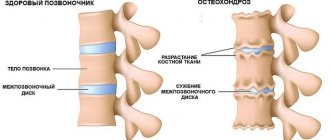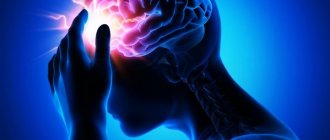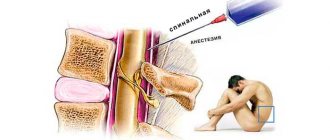Pregnancy is a wonderful time of waiting to meet your baby. This anticipation can be overshadowed by toxicosis in the early stages of an “interesting situation,” as well as constant headaches. Such symptoms occur quite often in pregnant women. Quite a lot has been written about toxicosis and the removal of its consequences.
But there is either no information about what can be used for headaches during pregnancy, or it is very controversial. The effect of dangerous drugs on the fetus is obvious; uncontrolled use of them can cause enormous harm. Let's figure out what a pregnant woman can do to overcome migraines and headaches.
Causes of headaches during pregnancy
Migraine is the most common cause of headaches experienced by expectant mothers. The attack is characterized by severe throbbing pain in one half of the head, accompanied by nausea, vomiting, and visual disturbances. With migraine with aura, “spots” and flashes first appear before the eyes, and skin sensitivity changes in certain areas of the body.
Factors contributing to the development of a migraine attack:
- frequent lack of sleep, fatigue, physical fatigue;
- stress;
- sudden climate change or weather events;
- external stimuli (sharp sound, smell, noise, flickering light);
- consumption of foods containing tyramine (citrus fruits, chocolate, cheese, etc.).
In some women, after pregnancy, the frequency and intensity of migraine attacks decreases (especially in the 2nd half). This occurs as a result of hormonal changes.
In addition to migraines, pregnant women often experience tension headaches. It occurs as a result of stress, overexertion (psychological or physical). An unpleasant sensation of a compressive nature, of lesser intensity, takes over the entire head.
In an uncomfortable position caused by prolonged work, pain occurs due to muscle strain in the shoulder girdle and neck. First it appears in the occipital region, gradually covering the entire head.
Hypotension is another cause of headaches. More often, blood pressure decreases in the first trimester of pregnancy, complicated by toxicosis.
Hypertension (high blood pressure) may be a manifestation of late toxicosis. This is a serious pathology, often accompanied by edema and the presence of protein in the urine.
As a result of vegetative-vascular dystonia and osteochondrosis, headaches may appear due to impaired blood circulation in the brain.
A significant increase in body weight during pregnancy can cause an increase in blood pressure, resulting in headaches.
It happens that during pregnancy, headaches become the main symptom of spinal diseases.
The load on it increases during this period, so an exacerbation of, for example, osteochondrosis, will be accompanied by a headache.
Meningitis, glaucoma, inflammatory processes in the paranasal sinuses are accompanied by headaches, the symptoms of which are characteristic of each of these diseases.
How to alleviate the condition?
There is no clear answer to the question of what can be taken during pregnancy if pain occurs in any part of the head. Most of the medications that are aimed at relieving this condition negatively affect the process of formation of the unborn child and directly on the course of pregnancy. In addition, there are many causes of headaches, and each requires an individual approach.
Simple tricks
If the unpleasant sensations are a consequence of overwork, you can cope with them by resting in a darkened, well-ventilated room. Rinsing your hair with warm water or taking a warm shower can relieve tension and reduce the severity of headaches.
During gestation, attacks of pain, if they are not caused by any disease, are treated with traditional medicine. These include:
- compresses using ice;
- decoctions of herbs inside (chamomile, lemon balm, mint, rosehip).
Treatment
What to take for headaches during pregnancy? Do not take pills without consulting your doctor. Some of them affect fetal development. In severe cases, a pathology incompatible with life develops.
It is especially dangerous to take such medications in the first trimester. In later stages of pregnancy, they can cause premature birth.
During pregnancy, you are allowed to take a limited number of medications (many medications that relieve an attack have a negative effect on the fetus).
What can you drink?
Doctors recommend different ways to calm your head, the quickest is to take a pill. There is danger here. It is not recommended to take medications without a doctor's prescription.
Pregnancy and breastfeeding should be done without medications. A new organism developing in the womb reacts sensitively to substances coming to it from the outside.
Medicines can negatively affect the development of the baby's organs, and the child may be born unhealthy.
Remember the main thing - headache is not always primary. In order to take the first aid kit at the first attack of a headache, you need to find out the cause of the pain. Your gynecologist will tell you which pill is best to take.
If there are no serious causes of painful sensations in the head, then pregnant women can take the following medications.
No-shpa
The most popular painkiller used among pregnant women, it helps with headaches and toothaches. No-spa is a safe and harmless antispasmodic that quickly penetrates the blood, reaches the nervous system and can relieve headaches.
The main advantage of No-shpa is its active substances, which do not affect the baby’s yet unformed nervous system.
Paracetamol
Helps relieve pain during pregnancy. The analgesic is not dangerous, but is effective for headaches and for reducing fever during colds.
It is safe only in small quantities, and there are some conditions for taking it. An overdose of paracetamol will cause unpleasant consequences for the child.
Panadol
The active substance of Panadol is paracetamol, but with an improved formula. Pregnant women can use children's Panadol, but in small quantities.
Pentalgin
Pentalgin can be taken by women only in the third trimester of pregnancy with the permission of a doctor. It contains caffeine and phenobarbital.
They will not harm an already developed fetus in the later stages in small quantities, but the slightest overdose can lead to irreversible consequences. In the first and second trimesters, Pentalgin is strictly prohibited.
Nurofen
The fifth drug on our list, Nurofen, unlike Pentalgin, can be taken in the early stages, excluding the last trimester. Nurofen should only be taken with the permission of a doctor. In the third trimester it is dangerous. In addition to pain relief, it causes uterine contractions and premature birth, which is dangerous for the baby and mother.
When you need to see a doctor urgently
If you experience a severe headache for the first time, you should immediately visit a doctor. You should definitely consult a doctor if:
- almost constant headache, especially if its symptoms have changed;
- with a symptom that occurs in the morning after waking up;
- pain with a specific localization in the head area;
- accompanied by symptoms characteristic of disorders of the nervous system;
- pain with low or high blood pressure;
- the appearance of disturbances in speech, hearing, vision, and motor functions.
The nature of cephalgia
Although the nature of headaches during pregnancy is individual, the expectant mother overreacts to any change in her usual surroundings, so it is better to forget about new cosmetics, clothes made of synthetic fabrics, or visiting a beauty salon for a while. Any preservative, dye, or flavor can provoke an allergic reaction, including anaphylactic shock. And the appearance of a headache is a general rule.
Headaches during pregnancy with varying intensity, cephalalgia is localized in a variety of areas, accompanied by numerous accompanying symptoms: vertigo, everything floats before the eyes, nausea, cramps of the calf muscles, flashing spots before the eyes, ataxia. This means only one thing: in case of any persistent headache that causes discomfort and reduces the quality of life, you need to urgently consult a doctor for advice.
Head pills during pregnancy
Let's look at what to drink for headaches during pregnancy. To relieve an attack, you can use Paracetamol, Panadol, Efferalgan. These medications are not addictive. Taking Panadol Extra is recommended only in case of headache resulting from low blood pressure (it contains caffeine).
No-shpa tablet relieves spasms, slightly lowers blood pressure, and relaxes muscles. It is allowed to take no more than 6 tablets per day. Contraindication: isthmic-cervical insufficiency.
There are special medications for the treatment of migraine attacks, some of which are approved for use during pregnancy. The problem of high blood pressure is solved by treatment, including antihypertensive drugs (prescribed by a doctor).
You can take Ibuprofen only until the 30th week (it affects the functioning of the lungs and cardiac activity). Prescribed by a doctor.
Citramon, Citrapar, Askofen, Aspirin should not be used in the first trimester due to the high risk of developmental defects in the fetus.
Taking Aspirin in the third trimester increases the risk of bleeding during childbirth.
Spazgan, Spazmalgon, Baralgin, Analgin can cause changes in blood composition with long-term use.
During pregnancy, you need to reduce your medication intake as much as possible, but what to do if you experience a severe headache during pregnancy? Let's consider treatment tactics.
What does such a symptom as a severe headache accompanied by nausea indicate? Read on.
Pregnancy is an unpredictable process, and if you have never had a headache before, then during this period women often experience migraines. This article https://neuro-logia.ru/zabolevaniya/migren/pri-beremennosti-lechenie.html presents medicinal and non-medicinal methods of treating migraine in pregnant women.
Prevention of pain attacks
The best treatment is prevention. This thesis also applies to headache attacks. An expectant mother with a history of migraine can keep a headache diary to control the situation. The date and time of the attack, as well as the circumstances that preceded its occurrence, are recorded.
You should completely stop or reduce your consumption of certain foods:
- hard cheeses;
- chocolate candies, chocolate, cocoa;
- sausages and sausages;
- chicken liver.
If an attack is caused by a feeling of hunger, you should eat in small portions. When leaving home for a long period of time, you can take dried fruits, a banana, an apple, and cookies with you. By raising your sugar levels, these foods will help you quickly satisfy your hunger. This recommendation is not suitable for pregnant women who suffer from diabetes.
It is known that headache attacks during pregnancy are a consequence of overexertion.
This is why expectant mothers are advised to get as much rest as possible. The duration of sleep should be the same regardless of the day of the week. Regular walks in the fresh air are also recommended.
Light physical activity will help maintain normal weight, and is also indispensable for relieving tension in the spinal column, neck, and legs. Avoiding muscle spasms will prevent headache attacks.
How can you reduce headaches during pregnancy without medications?
You should not rush to take medications to relieve symptoms. To reduce it, you can use traditional methods:
- try to relax and lightly massage your head;
- wash your hair with warm water;
- apply a cold compress to the forehead or back of the head;
- mash fresh cabbage leaves a little, apply to your head and hold until the pain disappears;
- brew herbal tea (chamomile, rosehip, lemon balm);
- with low blood pressure, drink strong tea with sugar;
- meditation;
- cold and hot shower;
- dream.
What should a pregnant woman drink for a headache, and what should she do first?
Before choosing a medicine, you need to measure your blood pressure. Doctors believe that every pregnant woman should have a blood pressure monitor at home in order to monitor the state of the cardiovascular system. If your blood pressure is low (below 120/80), then it’s better to just drink hot, strong tea and eat sweets. If you have high blood pressure, you should not take analgesics or buy an antipyretic; doctors advise you to consult a specialist and choose a drug to lower your blood pressure.
In the first trimester of pregnancy, it is better to completely forget about headache pills, since at this time the main organs of the child are formed, and the effect of drugs on this process can be very negative. Many women have successfully learned to cope with the problem by ventilating the room, resting in peace and quiet on a comfortable bed without a pillow. Often, health becomes satisfactory after a long, restful sleep. Pregnant women can get relief from headaches by self-massage of the temples, applying several ice cubes or cool cabbage leaves to the frontal part of the head.
You can also use compresses with leaves of fresh white cabbage. Before using this method, be sure to lightly mash the leaves to release their juices. It is recommended to keep the compress until the pain goes away. Sometimes a simple scarf or handkerchief tied around the head becomes an assistant in the fight against the problem. Tea made from chamomile, mint or lemon balm, as well as an infusion of these medicinal plants, will be a mild and safe pain reliever.
Prevention
For migraines, the causes of the attack should be identified (keeping a diary) and eliminated. If there is a connection between the consumption of foods and the occurrence of an attack, you need to remove them from your diet.
It is recommended to eat small meals (sometimes an acute feeling of hunger can cause a headache). It is advisable to carry some fruit or cookies with you to snack on.
Pregnant women need a full night's rest to prevent tension headaches.
It is recommended to sleep for a certain amount of time (oversleeping can also contribute to headaches).
It is advisable to spend more time outdoors; when working indoors, take short breaks every 30 minutes.
Try to avoid loud sounds, noise, and strong odors that can cause an attack.
Troubling headaches during pregnancy require consultation with a doctor. Only he can recommend medications approved for use during this period.
Many people attribute headaches to stress, fatigue and do not attach much importance to this symptom. But constant headaches are a reason to be wary. Frequent headaches: causes, types and associated symptoms.
What is primary and secondary headache and what is associated with frequent headaches in women, read on this page.
Causes of headaches in pregnant women
The most commonly considered syndrome appears in a pregnant woman for the following reasons:
- Decreased blood pressure. This condition is due to the fact that in a woman’s body during pregnancy, the level of progesterone increases significantly, and it has a relaxing effect on the muscle cells of the whole body, including the walls of blood vessels. The result of this action of progesterone is the dilation of blood vessels and a decrease in blood pressure. At the same time, the brain experiences a lack of oxygen, which causes headaches. The appropriate medications for low blood pressure should be prescribed by a specialist, since it is necessary to take into account the effect of each drug on the intrauterine development of the fetus. A pregnant woman herself can alleviate her condition a little by increasing her blood pressure with a cup of coffee (if it is not contraindicated by the gynecologist due to pregnancy).
- Hormonal changes. As soon as conception occurs and the fetus begins to develop in the woman’s body, changes begin to occur in the hormonal system. Such fluctuations aggressively affect the functioning of the central nervous system - this is the cause of frequent headaches in pregnant women. Treatment of the condition in question is not carried out against the background of hormonal changes, since health stabilizes/normalizes during the first three months of pregnancy. But if a woman complains of constant and intense headaches, then a specialist can prescribe painkillers that gently improve the psycho-emotional background (irritation, bad mood and insomnia can negatively affect the development of the fetus).
- Increased blood pressure. This condition occurs due to an increase in the volume of circulating blood in a woman’s body. If the patient has a tendency to hypertension, then preventive measures will need to be taken at the earliest stages of pregnancy. Headache associated with high blood pressure is relieved with specific medications that can lower blood pressure and not affect the intrauterine development of the fetus. To prevent this condition, a pregnant woman is recommended to reduce physical activity and control her own diet.
- Mental fatigue. We are talking about a pregnant woman who continues to work and spends a lot of time, for example, at the computer. Headache, as a rule, in this case disappears after proper rest, but the woman must adjust her entire lifestyle - follow a daily routine, rest in a timely manner, and do physical exercises in the morning.
- "Hungry" headaches. Pregnant women often have a lack of nutrients, such as blood glucose. Solving the problem is quite easy - a pregnant woman should eat often, but in small doses.
In addition to the listed factors, the following can trigger headaches in a pregnant woman:
- changes in weather conditions;
- rapid weight gain;
- exacerbation of chronic diseases;
- stress factor.











